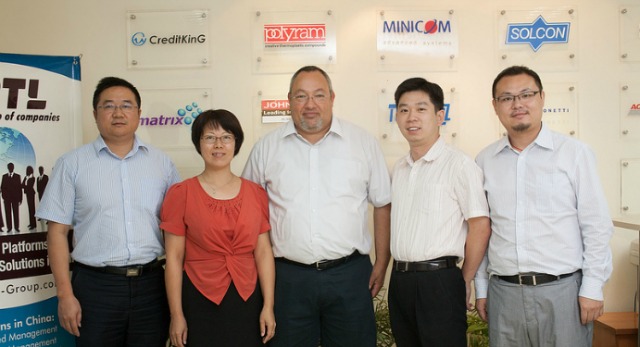Earlier this year, actors and support crew took the 12-hour flight from Beijing to Tel Aviv to make the first Chinese feature film in Israel — a romantic comedy shot in locations including Jerusalem, Tel Aviv and the Dead Sea.
The Tourism Ministry, which facilitated the shoot, predicts the number of Chinese tourists will reach a record 28,000 this year. But ties between these two Asian countries — one with a population of eight million, the other 1.3 billion – go way beyond tourism.
Spread the Word
• Email this article to friends or colleagues
• Share this article on Facebook or Twitter
• Write about and link to this article on your blog
• Local relevancy? Send this article to your local press
Israeli-Chinese partnerships in business, academia and culture have rapidly grown since the countries established diplomatic relations in 1992.
Chinese companies, academics and investors look to Israel for innovation in medicine, telecom, clean-tech, high-tech, food processing, aviation, biofuel, security and agriculture.
“They believe the Israeli people are very wise and successful since we have done amazing things in just 60 years,” says Dr. Amnon Amit, an Israeli gynecological oncology surgeon who led medical training sessions in a rural Chinese hospital. “They went for many years without any connection to the Western world, and now they want to follow our example of quick success.”
Just one recent example: Trendlines, a group of Israeli business incubators, presented 13 companies at the China-Israel Investment Symposium in Beijing in late August. As a result, Trendlines picked up its first Chinese venture investment, for one of its medical device startups.
On the other side of the equation, many Israeli inventions are not only manufactured in China and backed by Chinese financing, but also find eager buyers in the vast Chinese commercial and consumer markets.
“China plays an important role in sourcing Israeli imports and advancing market competition,” says Arie Zief, vice president of the Federation of Israeli Chambers of Commerce and host of last summer’s China Foreign Trade Fair in Tel Aviv. “China will remain a major source for Israeli import in the following years.”
This give-and-take relationship is characterized by mutual respect and shared goals.
“Israel is an important partner to us,” says Lu Qiuming, chairman of the Jiangsu Wujin Economic Zone (WEZ) in Changzhou, China, where an industrial incubator initiative for Israeli companies was established in 2011. “We both have a long history and culture, and extensive cooperation in both official and non-governmental ways.”
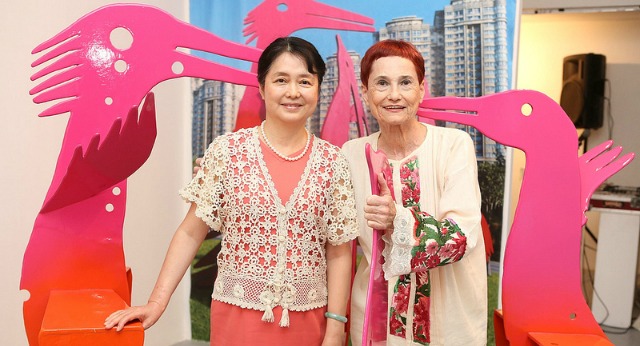
- Dina Merhav at her Tel Aviv show with Chinese Ambassador Madame Gao Yang Ping.
Just last May, Israeli Prime Minister Benjamin Netanyahu took a five-day working trip to China, during which he announced the establishment of joint R&D teams between Israeli and Chinese research agencies to further water technology and renewable energy strategies.
In June, Edouard Cukierman’s Catalyst V OneGate China- Israel Technology Fund teamed with the Foreign Ministry to organize Go4Israel, a second annual visit by a group of Chinese billionaires seeking opportunities in the Jewish state.
The Chinese consumer
More than 200 joint business projects have passed through the hands of Zvi Shalgo, chairman of the Israeli Chamber of Commerce in Shanghai, since he founded the PTL Group in 2000 to offer Israeli companies help with logistics, manpower, investment and financial services in the Chinese business environment. About 45 are currently active.
Speaking from Shanghai, Shalgo tells ISRAEL21c that China’s strength is manufacturing while its weakness is innovation. Israel’s situation is the opposite.
“We see that Israeli companies are not very large, but have high knowledge and strong growth potential,” Eric Zhao, vice director of investment promotion for the WEZ, told ISRAEL21c at the Tel Aviv launch of the incubator.
Israeli information technology provider Matrix Global is training the first cohort of 20 Chinese engineers hired for its mobile application development center in Changzhou. An October seminar in Tel Aviv is geared to sell Israeli companies on the Matrix apps, while the company looks into launching a China-based software quality assurance center.
While in Tel Aviv to sign an R&D center deal with Lexifone, maker of a new app that automatically translates phone conversations, Changzhou Vice Mayor Fang Guoqiang joked that the book Start-Up Nation ought to include a chapter on the growing Israeli presence in China.
Though manufacturing remains a major focus — among the newest Israeli ventures in China is a production line for Tuttnauer, which has been selling its sterilization and infection-control tools in China for almost 20 years – dramatic increases in the cost of production are driving a shift to manufacturing for Chinese consumers rather than for international markets.
“China’s online market is the biggest and quickest-growing market in the world, already surpassing the US online market in every parameter,” says Shalgo.
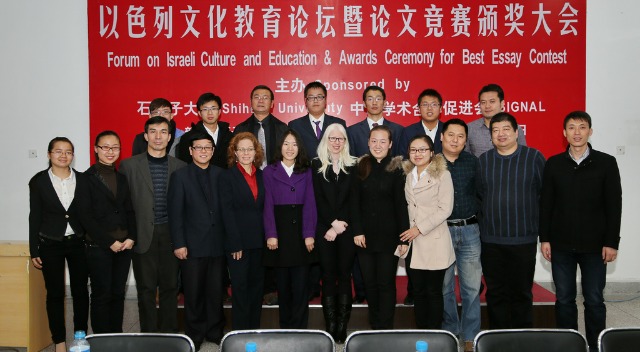
- Carice Witte, executive director and founder of SIGNAL, with Shanghai International Studies University Vice President Prof. Yang Li at the university’s 2012 Israel Studies Conference.
“For PTL, as a service company, it means shifting from manufacturing to Israeli high-tech startups. Most of these companies are not looking into China or Asia at all. They’d rather use their investment for the US or European market. But that’s in huge contradiction to the reality,” he explains.
“In China, investment money is just waiting for someone to come and ask for it. So we’re opening local investment platforms here to service Israeli startups from the early stage. There is huge interest from the Chinese side.”
In April, for example, Chinese healthcare giant Shanghai Fosun Pharmaceutical paid $240 million to acquire a 95.6 percent share of Caesarea-based Alma Lasers, a leading manufacturer of products for aesthetic and medical applications.
Tech, arts and academia
The big news here is the $130 million grant given to the Technion–Israel Institute of Technology by Hong Kong’s Li Ka-shing Foundation to upgrade the home campus in Haifa, alongside a $150 million investment by the governments of Guangdong Province and Shantou municipality to build a Technion-affiliated campus in China to train future engineers and computer scientists.
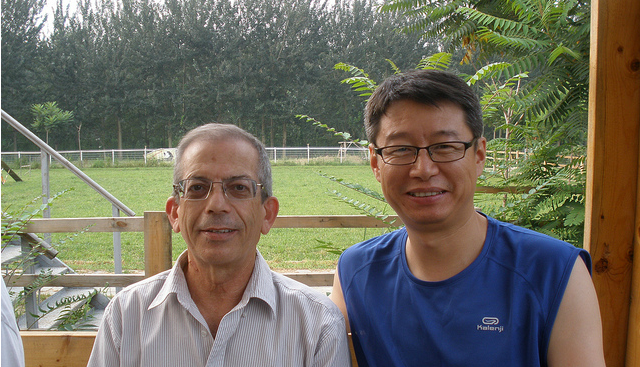
- AfiMilk’s Pinhas Gur and Charles Zhou, AfiMilk China general manager.
“This is the first time China has invested in and completely paid for a university to open up business and start operating in China,” says Technion spokesman Danny Shapiro.
Chinese students also want to learn about Israeli history. Since 2011, the Israel-based Sino-Israel Global Network & Academic Leadership (SIGNAL) has established seven Israel studies program in Chinese universities, and the newly opened Center for Contemporary Sino-Israel Studies at the School of International and Public Affairs of Shanghai Jiaotong University in partnership with Tel Aviv University (TAU).
“This will open a window for Chinese and international students to the state of Israel, its history, law, economy and culture,” said TAU President Joseph Klafter at the inauguration on September 16.
SIGNAL also is developing a year-abroad program in Israel for Chinese college students.
“China defines itself as a growing ‘great power’ and is actively interested in learning from Israel’s entrepreneurial and innovative high-tech successes as well as its cultural national achievements,” says SIGNAL founder Carice Witte.
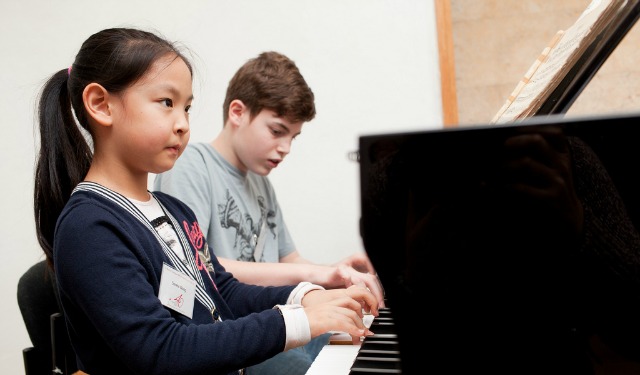
- Serena Wang, 8 and Alon Karib, 13, playing piano together at the Chinese-Israel Joint Master Class for Outstanding Young Pianists at the Jerusalem Music Center. Photo by Yael Ilan
Earlier this year, Hebrew University of Jerusalem (HUJ) President Menahem Ben-Sasson led a group of Israeli academics on a visit to six top Chinese universities as HUJ prepares to open a Confucius Institute to promote Chinese language, culture and history. A Confucius Institute has already been active at TAU since 2007.
China continues to count on Israel for cutting-edge knowhow in growth areas including dairy farming, desalination, communications processors, digital printing technologies and aquaculture.
Cultural partnerships are also blossoming. Recent examples are a master-class program last summer for young Israeli and Chinese pianists at the Jerusalem Music Center; several Chinese government commissions from Israeli sculptress Dina Merhav; and a team of expert Chinese ice sculptors flown in to create last winter’s Ice City in Jerusalem.
Fighting for Israel's truth
We cover what makes life in Israel so special — it's people. A non-profit organization, ISRAEL21c's team of journalists are committed to telling stories that humanize Israelis and show their positive impact on our world. You can bring these stories to life by making a donation of $6/month.





